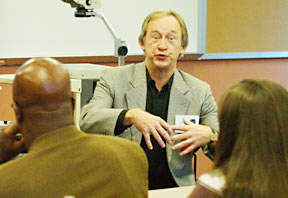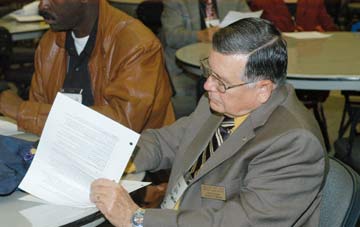Around the State
Posted: 11/17/06
Around the State
• The University of Mary Hardin-Baylor campus newpaper, The Bells, won first place overall in its division and five other awards at the Baptist Press Excellence in Journalism competition in Nashville, Tenn. The UMHB yearbook, The Bluebonnet, placed second overall.
• Mark Yates has been named Baptist Student Minis-tries director at East Texas Baptist University. Yates had been named interim director in August. He has been at ETBU 10 years, working as an admissions counselor as well as assistant director of international education.
| Adamsville Church in Adamsville recently held a celebration to kick off the re-organization of its Women on Mission program. Clowns Sugarfoot and Sugarpie greeted the women, including Director Wenona Conley, who celebrated her 83rd birthday at the event. The use of clowns indicates the women plan to be fresh and fun in their ideas for ministry, leaders say. |
• Pamela Bryant, associate professor of chemistry and chair of Howard Payne University’s department of physical sciences, is one of 150 higher education professionals featured in College Faith 3. Bryant’s testimony in the book details the financial challenges she faced as a sophomore at Augusta College in Georgia when all the money she earned during the summer was stolen from her purse—at church. Her parents could not afford to pay the tuition she had saved for, but “God’s love, poured out to me through the gifts of his people,” allowed her to receive the funds needed, she said.
• Clairene and Fred Herold have pledged a $100,000 gift for the campus building fund of Dallas Baptist University.
Anniversaries
• Butch Foster, 25th, as minister of education at First Church in Goldthwaite, Nov. 12.
• Bill Swinney, fifth, as minister of education/music at First Church in Floydada, Nov. 12.
• First Church in Ranger, 125th, Dec. 2-3. The celebration will begin with a dinner at 6:30 p.m. Saturday. The 125th anniversary quilt, containing names of present members and pictures of former pastors since 1950, will be on display along with the anniversary scrapbook and photo albums from past years. Former Music Director Eliezar da Silva will sing. Sunday morning’s guest speaker will be former Pastor Franklin Krause. Former Music Director Stan Hanes will lead the music. Richard Waters is pastor.
Deaths
• Pete Fast, 88, Oct. 27 in Dallas, Ore. He was a minister of music and education 60 years, serving Texas churches in Sweetwater, Abilene, Fort Worth, Odessa, San Benito, Port Arthur and Houston 30 years. He is survived by his wife of 63 years, Naomi; daughter, Renee Heathcott; one granddaughter; and three great-grandchildren.
• Anne Davis, 69, Nov. 9 in Waco. She was a pioneer in church social work. She directed the Baptist Community Center in Lexington, Ky., and then the Portland Baptist Center in Louisville, Ky., before joining the faculty of Southern Seminary. She led the seminary to become the first non-university to be accredited for the master of social work degree. She retired from the seminary in 1995 and moved to Waco in 1998, when she became director of operations for the Advocacy Center for Crime Victims and Children. She is survived by her sisters, Janice Crutchfield and Carolyn Davis; and brother, Mike.
• Paul Smith, 88, Nov. 14 in Waco. A minister more than 60 years, he was pastor of Jonesboro Church in Jonesboro, Speegleville, Oak Lawn and North Waco churches in Waco, Old Time Church in Riesel, First Church in China Spring, First Church in Elm Mott and Park Temple Church in Fort Worth. He also was administrator of Alto Frio Encampment. He was on the executive board of Latham Springs Encampment more than 40 years. He recently retired after 25 years as jail chaplain and director of Operation CRISIS for Waco Regional Baptist Network. He was preceded in death by his first wife, Syble. He is survived by his wife, Polly; son, Fred; and a granddaughter.
Events
• Recording artists Point of Grace will be at The Heights Church in Richardson Dec. 9. All seats are reserved. Tickets are $10 to $25. For more information, call (972) 238-7243.
• North Pointe Church in Hurst will present its Christmas music Dec. 1-3. Times will be 7:30 p.m. Friday; 2 p.m. and 7 p.m. Saturday; and 10 a.m. and 2:30 p.m. Sunday. An offering will be taken following each performance.
News of religion, faith, missions, Bible study and Christian ministry among Texas Baptist churches, in the BGCT, the Southern Baptist Convention ( SBC ) and around the world.




